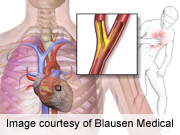
SUNDAY, March 10 (HealthDay News) — The drug Ranexa (ranolazine) may help reduce chest pain in people with type 2 diabetes, a new study finds.
The drug is approved in the United States for treatment of chronic angina (chest pain), but this is the first study to evaluate it in patients with diabetes, heart disease and angina, according to the researchers.
One expert not connected to the study said the findings are welcome news for patients.
The study “demonstrates that ranolazine is very effective in reducing angina in those with type 2 diabetes and, interestingly, is more effective in those with higher blood sugars,” said Dr. Howard Weintraub, clinical associate professor in the department of medicine at NYU Langone Medical Center in New York City.
People with diabetes are at increased risk for heart disease, and people with heart disease and diabetes are more likely to have angina than those without diabetes, the researchers noted.
The study included more than 900 patients who received either 1,000 milligrams of Ranexa or an inactive placebo twice a day for eight weeks. The patients had type 2 diabetes, heart disease and at least one angina episode a week, and were already taking one or two other anti-angina drugs.
Between weeks two and eight of the study, patients taking Ranexa had an average of 3.8 angina episodes per week, compared with 4.3 episodes per week for those taking the placebo. Patients taking the drug used 1.7 doses of nitroglycerin per week, compared with 2.1 doses per week among those in the placebo group. Nitroglycerin is commonly used to treat or prevent episodes of chest pain in people who have coronary artery disease (narrowing of the blood vessels that supply blood to the heart).
The study was scheduled for presentation Sunday at the annual meeting of the American College of Cardiology in San Francisco. It was also published online the same day in the Journal of the American College of Cardiology and will appear in the journal’s May 21 print issue.
The study was funded by Gilead Sciences, Inc., which makes Ranexa.
“Angina is associated with worse quality of life, increased risk of hospitalization and higher health care costs, and appears to be more prevalent in patients with diabetes,” study lead author Dr. Mikhail Kosiborod, associate professor of medicine at the University of Missouri, Kansas City, and a cardiologist at St. Luke’s Mid America Heart Institute, said in a meeting news release.
“While ranolazine was shown to be effective in reducing angina in prior studies, this is the first time it has been prospectively evaluated in patients with diabetes — a high-risk and therapeutically challenging group,” he added.
The study also found that Ranexa had the strongest effect in reducing angina episodes among patients with poor blood sugar control. Prior research has shown that the drug may lower fasting glucose levels in people with diabetes.
“Ranolazine is an effective anti-anginal drug in patients with diabetes and may also have a glucose [blood sugar]-lowering effect,” Kosiborod said. “If the glucose-lowering action of ranolazine is confirmed in future studies, patients with diabetes and angina may derive a dual benefit from this drug.”
Weintraub agreed. “As the focus of the treatment of angina in diabetics increasingly focuses on [drug] therapy, this may offer another choice in optimal medical care in this group of patients,” he said.
The majority of the study patients were men (61 percent). Ninety-six percent had high blood pressure and 74 percent had a history of heart attack. Most patients were taking cholesterol-lowering statins (82 percent) and heart drugs such as ACE inhibitors (88 percent). Sixteen percent were smokers.
About 347 million people worldwide have diabetes and about 90 percent of those people have type 2 diabetes. The main causes of type 2 diabetes are believed to be excess weight and lack of physical activity. One in three American adults could have the condition by the year 2050, according to the U.S. Centers for Disease Control and Prevention.
More information
The U.S. National Institute of Diabetes and Digestive and Kidney Diseases has more about diabetes.

